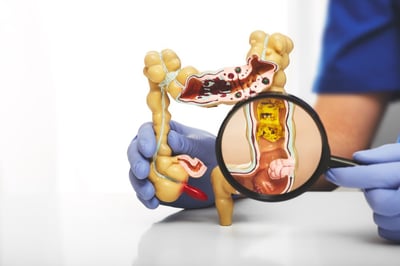Search Results: Prevention, Detection & Risk (6 results)

Prevention
Testing a combination of vaccines for cancer prevention in Lynch syndrome
Lynch Syndrome Vaccine Study
This study is being done to assess the safety and effectiveness of a series of vaccines (Tri-Ad5), together with another drug (N-803) that magnifies the body’s response to vaccines, to see if there is an effect on the risk of developing colon and other cancers in LS patients.

Prevention
Prostate screening with MRI for men with Lynch syndrome (MLH1, MSH2, MSH6, PMS2, EPCAM) or a BRCA1, BRCA2, HOXB13, ATM, NBN, TP53, BRIP1, CHEK2, PALB2, RAD51C, RAD51D, or other mutation
Screening Study for Men at High Genetic Risk for Prostate Cancer
The National Institutes of Health has a clinical trial for men at high genetic risk for prostate cancer. This is trial is for men without prostate cancer, ages 30 to 75, who have tested positive for Lynch syndrome (MLH1, MSH2, MSH6, PMS2, EPCAM) or BRCA1, BRCA2, HOXB13, ATM, NBN, TP53, BRIP1, CHEK2, PALB2, RAD51C, RAD51D, or FANC (FANCA, FANCB, FANCC, FANCD2, FANCE, FANCF, FANCG, FANCI, FANCL, and FANCM). The trial involves screening MRI of the prostate every two years and biopsy of the prostate if the MRI is abnormal. There is no cost for travel or study-related tests.

Prevention
People with Lynch Syndrome at risk for colon cancer
Collecting Blood and Stool Samples to Detect Colorectal Cancer or Precancerous Polyps in Lynch Syndrome Patients, CORAL Study
This study will colect blood and stool samples to detect colorectal cancer or precancerous polyps in people with Lynch syndrome and those diagnosed with early onset colorectal cancer, diagnosed younger than 50 years old.

Prevention
Prevention study for people with Lynch syndrome
A Study Comparing Two Anti-inflammatory Medications Naproxen or Aspirin for Cancer Prevention in Lynch Syndrome
The trial is enrolling people with Lynch syndrome. On average, the length of this study will last one year from the start of enrollment to completion. The study will measure the effect of naproxen or aspirin on the immune cells in the gastrointestinal tract of people with Lynch syndrome. The trial will also evaluate any symptoms from the medications and any other changes of the colon and rectum.

Prevention
Observational study for people with family history of pancreas cancer or an inherited mutation linked to pancreatic cancer risk
Blood Markers of Early Pancreas Cancer
The purpose of this study is to try to find markers of early pancreatic cancer for individuals at higher-than-average risk, expedite the diagnosis in individuals with symptoms, and substantially improve an individual's chance of surviving the disease.

Prevention
Screening study to detect pancreatic cancer and precancer in people with either a strong family history of pancreatic cancer, or an inherited mutation associated with pancreatic cancer risk
A Pancreatic Cancer Screening Study for High Risk Individuals
The purpose of this study is to screen and detect pancreatic cancer and precancer in people with either a strong family history of pancreatic cancer, or an inherited mutation associated with pancreatic cancer risk.
Magnetic Resonance Imaging (MRI) will be used to screen for early stage pancreatic cancer. Participants will also be asked to donate a blood sample at specific intervals for the creation of a blood bank necessary for the development of a blood-based screening test for pancreatic cancer.
Additional Results on Clinicaltrials.gov Prevention, Detection & Risk + lynch syndrome
5 results
| Clinical Trial | Official Title |
|---|---|
| NCT06708429 | Lynch Syndrome X-Talk of Enteral Mucosa With Immune System |
| NCT03568630 | Blood Markers of Early Pancreas Cancer |
| NCT05410977 | Collecting Blood and Stool Samples to Detect Colorectal Cancer or Advanced Neoplasia in Lynch Syndrome Patients, CORAL Study |
| NCT03250078 | A Pancreatic Cancer Screening Study in Hereditary High Risk Individuals |
| NCT05129605 | Prostate Cancer Genetic Risk Evaluation and Screening Study |
